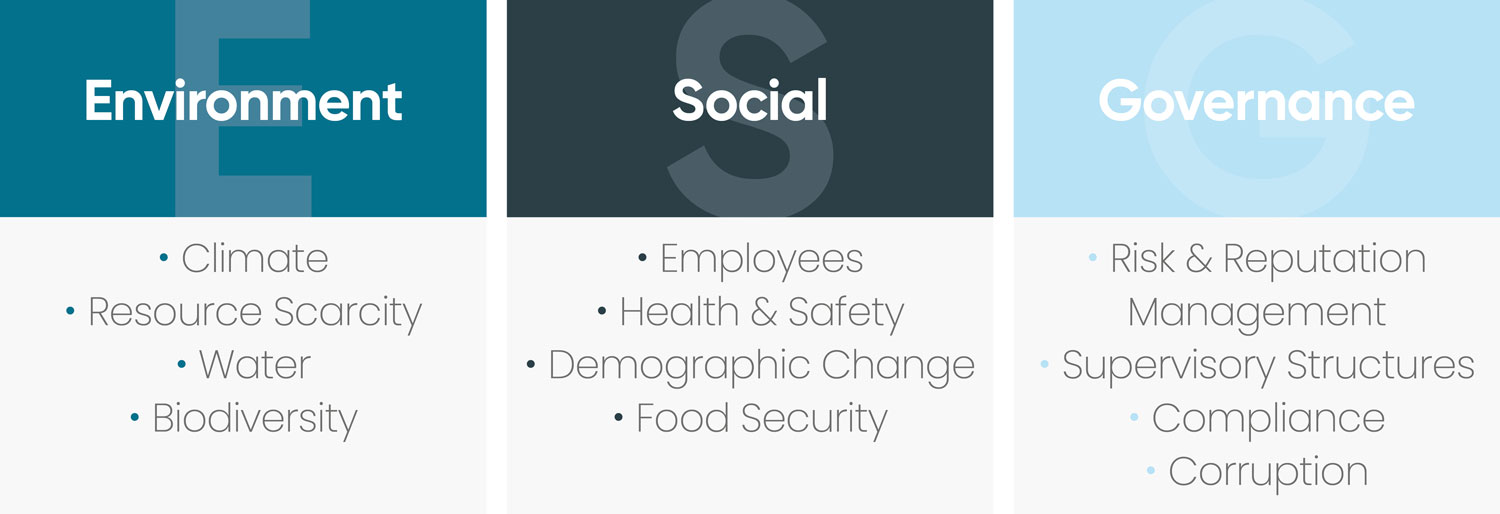In an era defined by climate change, social responsibility, and corporate governance, the principles of Environmental, Social, and Governance (ESG) have become crucial considerations for businesses across all sectors.
What is ESG?
In brief, ESG involves the detailed measurement of how an organisation is performing against their long-term environmental, social and governance commitments.
Not only do such factors demonstrate an organisation’s commitment to sustainability and the environment, but it can also influence existing and future customer behaviour. That’s why we’re highlighting the power of ESG, and the importance of investing in a comprehensive ESG strategy.
Understanding ESG
ESG represents a framework for assessing a company’s performance and impact in three key areas:
- Environmental
The environmental aspect examines a company’s efforts to mitigate environmental risks, reduce carbon emissions, conserve natural resources, and promote sustainable practices. This includes initiatives like investing in renewable energy sources, optimising energy efficiency and adopting responsible waste management practices. - Social
The social dimension evaluates a company’s commitment to fostering positive social impacts within its operations and the wider community. This involves promoting diversity, inclusion, and equal opportunities. It also includes supporting local communities, and prioritising health and safety measures.The levels of expectation and transparency for social responsibility are ever-increasing. It now widens to a company’s supply chain selection process. Purchasers are paying more attention to what their suppliers are doing, as ultimately by trading with them, they can be associated/or seen to have shared responsibility, of that suppliers social activities.For business and organisations that are committed to operating in a socially responsible way, they can apply the ISO 26000 standard. - Governance
Governance focuses on the company’s internal structure, accountability, and transparency. Strong governance practices encompass effective board oversight, ethical decision-making, risk management, and transparent reporting mechanisms.
How can Consultiv Utilities help?
Our dedicated team play a pivotal role in assisting your navigation through the complex landscape of ESG considerations. We offer tailored advice and solutions, enabling you to integrate sustainability principles into your business strategies, positioning you as a responsible organisation.
- Assessment and strategy development
We’re able to conduct a comprehensive ESG assessment for your organisation, identifying areas of improvement and potential risks. By evaluating your operations, supply chain and resource usage, we can help develop a robust ESG strategy to align with your business goals and values. - Energy efficiency and renewable solutions
Our experienced team can guide you towards adopting energy-efficient technologies and renewable energy sources. This may involve recommending energy management systems, optimising industrial processes or facilitating the adoption of solar or wind power. All of which will help towards reducing your carbon footprint and contributing to a cleaner environment. - Data analytics and reporting
Accurate data collection, analysis, and reporting are essential components of an effective ESG program. Consultiv Utilities can assist you in:
– Implementing reliable data management systems
– Monitoring key performance indicators
– Generating transparent reports to demonstrate progress and compliance with ESG standards - Stakeholder engagement and collaboration
We can help your organisation to establish strong relationships with stakeholders, including investors, employees, customers, and local communities. By facilitating meaningful engagement and dialogue, we can support you with enhancing transparency, building trust, and fostering collaboration to address shared sustainability challenges.
ESG vs CSR
It’s important to know the differences between ESG and Corporate Social Responsibility (CSR).
The sustainability commitments of an organisation often come within their CSR. Although this may sound similar to ESG, there are some differences.
CSR refers more to strategy and ensuring that an organisation has an ethical procedure in place to deliver their commitments. It’s likely to refer to a company’s values and policies, is often voluntary and is used as in internal initiative too. On the other hand, ESG is used to evaluate the extent to which an organisation has performed against their CSR goals. ESG are a structured framework of criteria used to measure and evaluate a company’s overall long-term sustainability performance.
Although there are measured reports within CSR, ESG is much more data-intensive and provides a more quantitative measure of sustainability.
We’ve put together a Q&A section below
What is the main goal of ESG?
The main goal of Environmental Social Governance is to manage the risks and opportunities that may have an impact on an organisation’s financial performance and/or reputation.
Is ESG mandatory?
For larger companies, yes it is mandatory as set out by the Task Force on Climate Related Financial Disclosures (TCFD). If an organisation has >500 employees or >£500m annual turnover they must report on ESG. This impacts approximately 1,300 private companies, such as AIM-listed entities, banks and insurance companies.
Is ESG a risk?
The main risks when reporting on your ESG is for your performance rating being poor. If you have a poor rating, and you are a listed business, this will have a negative impact with investors. Potentially investors could exclude you form their investment portfolio, plus it could impact negatively with customers, suppliers and employees.
Is ESG good or bad for businesses?
Addressing and measuring ESG helps your organisation to stay up to date with ever-changing regulations. This means you reduce the risk of being non-compliant, which could result in legal issues and/or reputational damage. If your ESG score is high it indicates to potential investors that you are effectively managing your ESG and that this is likely to lead to better financial performance. This then also implies that your organisation would be a low-risk investment. A positive ESG rating can also help to promote your business as a good employer, a sound supplier or just a good company to do business with.
If your ESG score is low it can have the opposite impact in that it can indicate your business as being less effective in monitoring risk, potentially has a negative environmental impact, and can be linked to poor employee wellbeing.
Who does ESG benefit?
Reporting on ESG is ultimately beneficial to your own business, as you are demonstrating your risk management and commitments to monitoring your compliance. The reporting of which can be viewed by potential investors and consumers for them to make more informed purchasing decisions. By demonstrating a commitment to ESG, your organisation is viewed as more sustainable, ethical, reliable and, overall, a favourable business to trade with or invest in.
Not only this, but by executing ESG effectively you can also see an improvement in your organisation’s financial performance. Many efforts towards sustainability improvement, such as reducing energy consumption, can effectively improve your business’s bottom line.
Your business and your employees will benefit from a long-term ESG strategy. Your employees will feel valued, knowing that their employer (you) has their wellbeing, health and safety as an ongoing focus. This promotes employee satisfaction and retention, can boost recruitment efforts and promote strong leadership.
Who regulates ESG in the UK?
It was stated in the Spring Budget on 6 March 2024 that The HM Treasury (HMT) will regulate the provision of Environmental Social Governance ratings. Legislative steps and timelines are expected to be announced later in the year.
Why is ESG important?
Environmental Social Governance reporting is particularly important to companies that wish to attract investors and attain a competitive edge. The ESG score of your organisation is often assessed by potential investors when they are measuring the risks on whether to invest.
In the UK, reporting requirements emphasise the importance of companies having a thorough understanding of which aspects of their supply and value chains are most vulnerable to climate risks. Investors support this approach because organisations that are aware of climate issues are better equipped to mitigate risks and seize opportunities, leading to enhanced business performance.
Conclusion
Our team at Consultiv Utilities are here to guide our clients toward sustainable business practices and ESG excellence. By leveraging our expertise, your organisation can foster long-term partnerships, drive positive change, and contribute to the collective effort of meeting the governments net zero 2050 target. Contact one of our energy experts today to arrange a free consultation.
We hope you found our blog useful. Share your thoughts with us via email at info@consultivutilities.com.
Categories:


